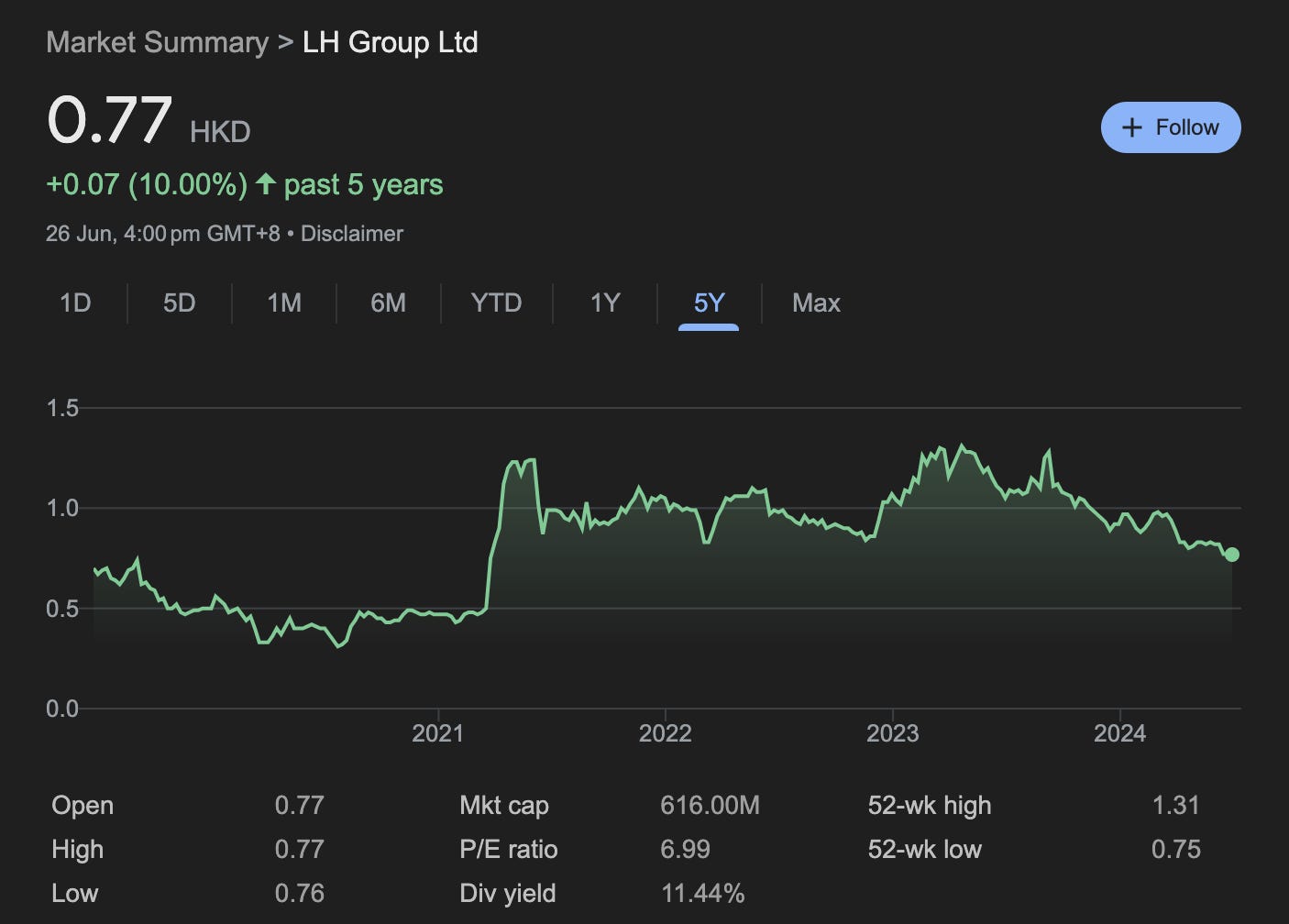2024 Week 26
Tam Jai, Fairwood, Cafe De Coral, LH Group, Taste Gourmet, Plover Bay Technologies
Tam Jai, Fairwood, Cafe De Coral, LH Group, Taste Gourmet - are they not tasty enough?
One of the observations I have made during my recent travels into Hong Kong and Shenzhen is that the catering trade is getting rough. Retail is dead and restaurants of all sorts seem to be at every corner of every building.
But like any competitive trade, there are always a few companies that stand out.
I have been tracking Tam Jai since their IPO. When they first opened in Singapore, I was the first few who trekked down to Chinatown Point and grabbed myself a bowl of noodles. While I am impressed by the IPO numbers, I am not impressed by the taste of the noodles. In Singapore, we are used to strong spices and Tam Jai’s style of noodles just do not appeal to me.
I guess certain tastes just do not travel well.
But the conversation with the regular (younger) Hongkonger highlighted to me that Tam Jai is undoubtedly HK’s favourite restaurant. Quoting from a few people, it is the place to go when you just do not know what you want to eat.
Despite being Hongkonger favorite restaurant chain, they have struggled in their overseas expansion plans in China and Singapore. A hefty dividend of 8% and a declining share price is an indication of their overseas struggle. Their recent refocus back in HK, may just help them to recover some of that shine.
If you extrapolate out the popularity of Tam Jai in HK, It seems that the younger Hongkongers no longer like the cha chang teng (hong styled cafe) of the past. The single store popular cha chang teng still draws in the tourists, but the modernized cha chang teng chain like Cafe De Coral (Coral) and Fairwood could only draw in the older and much more budget constrained crowd.
Coral, the original has been declining for the past 5 years and now sport a 7% dividend.
The successful copycat Fairwood has followed an almost similar downward trajectory and now sport a 6% dividend.
Both of them have been tweaking their menu and format, but I do not see how they could fight against the general trend of the HK consumers. Both should just continue to muddle along and become a shadow of their former self.
On the other hand, you can see the proliferation of Japanese food cuisine in all parts of the world including HK. One of the beneficiaries of the universal appeal of Japanese food in HK is LH Group (LH). Riding on the popularity of yakiniku, LH has become possibly the largest yakiniku player in HK.
LH mainly operates franchised outlets from Japan. As franchise operators, they should supposedly have lower margins and ROE. Through astute financial management, they have an ROE of 20%, and have been able to pay out more than 100% of their earnings giving a dividend yield of 11%.
Taste Gourmet (Taste) which I have covered multiple times in this blog, is an operator of multiple brands across multiple cuisines. Japanese cuisine like Shabu Shabu plays a big part in their rise as a reputable operator.
Similar to LH, they have been astute in their capital allocation, paying 50% of the earnings while ensuring growth. Unlike LH, their ambition is to become a multi brand and multi cuisine company.
Minus the negative effect of more and more Hongkongers leaving HK for Shenzhen to get their dietary fixes, I think the latter companies like LH and Taste are a much better bet than Coral or Fairwood.
At the right price, I might also be a buyer of Tam Jai.
Plover Bay - bringing private interest into a public investment
On my first trip to Hong Kong in April, I visited Plover Bay Technologies (Plover) and was duly impressed by the dynamism and entrepreneurialism of Alex - Founder and CEO of Plover. He peppered us with the technology stack that he is building, leaving us minimal time to ask questions. I know that I will have a second trip to complete my due diligence.
On my most recent-second trip to Hong Kong in June, I met up with their CFO Christopher to talk more about their business and charging model. I also managed to meet up with Simon, their newly appointed VP of sales and development to talk about using their expansion plans.
In addition, I link Simon up with a private technology firm that I am vested in to take on the deployment of Plover’s product in India.
This has to be the best way to do due diligence. Other than being a shareholder, I am doing due diligence as a business partner.
But alas, when a company is really exceptional there is really very little time to do due diligence in this manner.
A few good results and a positive alert is enough to send the stock much higher.
Sometimes, for the exceptional companies with exceptional management, the gut is a good enough filter.
There may not be enough time to do an in depth analysis!






